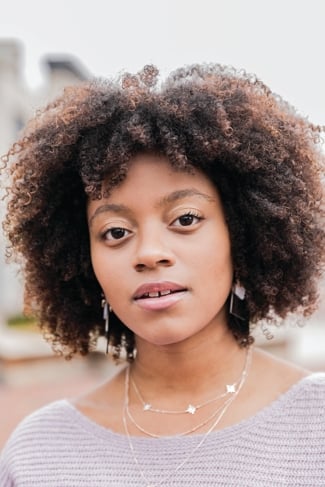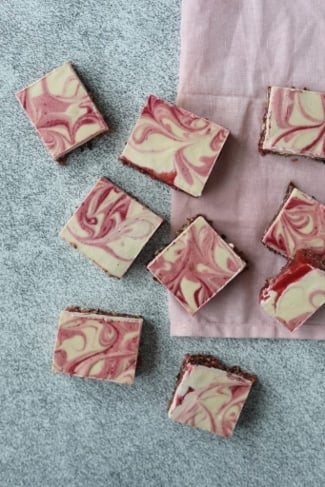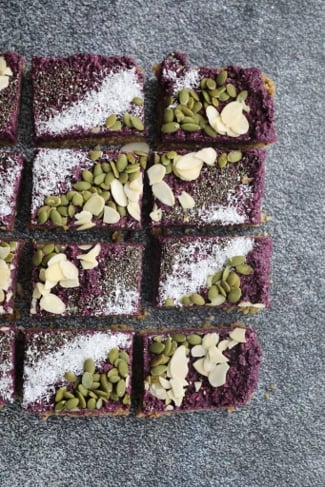
Last year was tumultuous—a day-to-day reckoning with many unknowns. If you feel lost as the new year begins, unsure of what goals to set, don’t despair. Confusion can be a necessary precursor to becoming more authentic versions of ourselves, and abiding by our true selves is what we <really> need when it comes to goal-setting.
Haile Thomas reminds herself of this regularly. Not long ago, the young entrepreneur and health activist felt overwhelmed and stressed. Barely an adult but already earning accolades befitting one, she struggled to balance her work with her well-being.
“I had reached a breaking point and decided I needed to figure out how I could best take care of myself,” says Thomas, 20. She started journaling, which at first felt foreign but eventually yielded comfort. “I’ve always been very curious about the world. I’m used to asking questions. But in terms of directing that toward myself, that has been something new.”
Now, she’s inspiring others to ask probing questions of themselves as a tool for achieving lasting change and true wellness.
Starting from scratch
Thomas and her work—which started before she was in double digits—defy a single title. Ask her, and she’ll say she’s a wellness and compassion activist. Also: a speaker and the CEO of HAPPY, the nonprofit organization she built to inspire young people to holistically take care of themselves and the world (HAPPY is an acronym for Healthy, Active, Positive, Purposeful Youth).
A few years ago, she enrolled in the Institute for Integrative Nutrition’s health coaching program; at age 16, she become the program’s youngest graduate. At age 12, she created a winning dish for the first White House Kids’ State Dinner. At age nine, she started her own YouTube show, <Kids Can Cook>. That summary isn’t exhaustive, but her endeavors are “all interconnected,” Thomas says.
Everything started with food. When she was just five, Thomas, whose parents are from Jamaica, sidled up to her mother at the stove. A few years later, after her father was diagnosed with type 2 diabetes and prescribed medication with a terrifying list of potential side effects, her mother researched alternatives, and family meals transformed from being heavy on white rice and meat to spotlighting veggies.
“We were all watching food documentaries together and remixing our recipes,” says Thomas, who lives with her parents and younger sister in New York’s Hudson Valley. “We were able to completely reverse his condition.”
Her health quest continued. “I randomly came across this article about red meat causing cancer,” Thomas says. It stuck with her. She’d heard about veganism and decided to give it a shot for six months. Her parents and sister joined. Thomas was 14. They’ve all been vegan since.
Last year, Thomas’s lifelong love of food culminated in her authoring <Living Lively>, a collection of 80 plant-based recipes* … and a whole lot more.
Self-care, redefined
Like Thomas, Living Lively, defies categorization. Thomas calls it an “empowerment cookbook”: half loving instructions for self-growth, achieved through contemplation and journal-like entries, and half recipes and strategies that speak to cooks, novice through expert.
“Living Lively is rooted in this idea of being self-reflective and really diving into the elements that shape us,” Thomas says. “It’s so important because we can kind of operate within society, in our own lives, on autopilot, where we’re just absorbing whatever is happening, continuing to react in the ways that we have been conditioned to react or are comfortable with, and not really questioning why certain things trigger certain emotions or reactions.”
Thomas describes journaling and self-inquiry as “the core and staple part” of her wellness routine.
“In many ways, that has been my introduction to almost a deeper element of self-care—beyond my plate, beyond face masks and things like that,” she says. “I think there’s this deeper awareness … and this mindfulness that emerges too. It’s where you’re keeping track of yourself, your progress, your mental states, your ideas and emotions, and watching this flowering, in a way, of different versions of you over time. It’s a cool experience, but also a way to really hold ourselves accountable to actively become who we believe we are and who we can be, every single day.”
Take an inner interview
The best way to set your goals for 2021 is by listening to your inner voice. Otherwise, you’ll backtrack or feel frustrated. Thomas asks herself key questions every month in order to recalibrate and feel tuned in to herself. Below are five of her favorites and why they matter.
What emotions am I experiencing right now?
Why it works: It forces you to be engaged in the present moment.
How can I honor those emotions instead of resisting or avoiding them?
Why it works: It allows you to accept and process your emotions fully.
How can I become my own safe space?
Why it works: It teaches you to provide for yourself that which you might seek outside of yourself.
What inner evolution, big or small, can I celebrate?
Why it works: Celebrating personal wins of all kinds creates self-compassion.
What actions can I take to protect my energy and use it intentionally?
Why it works: It reminds you that your wellness is within your power.
Define your own success
Pursuing your self-to-be can be daunting—but it’s also exciting. There’s a new you waiting, and you’ve got sole custody over how you turn out. Being deliberate about your evolution engenders the stick-to-it-iveness that lasting change demands. It also creates space for you to become self-aware, Thomas notes. Drawing from what she calls your “7 Points of Power” in <Living Lively>, here’s how Thomas suggests going after your goals in 2021.
Week 1: Launchpad
Take, and then review, your inner interview (see p. –). You might discover that conducting your inner interview many times (use that journal!) reveals your clearest desires for the new year. Hunt for clues. Your responses will inform the following seven aspects of your life, one for each of the next seven weeks: wellness, mindset, relationships with others, societal influence, education, world perspective, and creativity.
My goals for 2021:
Week 2: Wellness
No matter your goal, wellness should play a role. There are many types of wellness, including physical, emotional, spiritual, financial, intellectual, environmental, and social. Define what wellness means to you, and throughout the week, notice which type or types of wellness your goals connect with.
What wellness means to me:
Week 3: Mindset
Your goals will be much more achievable if you’re on your own side. But mindset is probably the toughest aspect of our lives to get a handle on, and our thoughts affect everything we do. Good news: There are tools that help. This week, create one positive affirmation about yourself each day (and yes, they can relate to your goals).
Week 4: Relationships with others
Your relationships nourish or zap you. That, in turn, affects whether you’re able to reach your goals. Define a healthy relationship. Then use the week to observe how you feel when interacting with key people in your life. You’ll notice certain dynamics are good for you while others aren’t. Steer yourself toward those that are good for you. (Shifting relationships could require more than one week, but—yay for you!—you’ve taken the first step.)
Week 5: Societal influence
Outside influence plays as big a role as you let it. If you look at magazines, read the news, or use social media, it affects you (and your goals), so managing the onslaught is important. This week, consider whether the media you consume is good for you or toxic for you, and then take a step or two to tip the scales for the better.
Week 6: Education
Find one thing you can learn to get you closer to your goals, and then spend some time on it.
Week 7: World perspective
How you view the world affects how you interact with it, and that can be holding you back or propelling you toward your goals. This week, make an effort to connect with someone who is different from you, and then consider what you learned from your interactions.
Week 8: Creativity
Creativity makes us powerful, and everyone is creative in some way. So have fun this week: Come up with one creative thing you can do to help you meet your goals. And then do it!
Try out a couple recipes from Living Lively
Cashew Cheesecake Squares
 Feel Better Berry Bars
Feel Better Berry Bars

